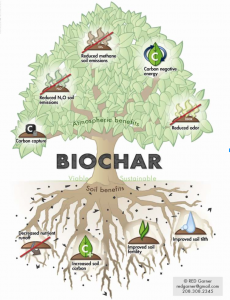Biochar Information
Dec 3rd, 2014 by bautir
What is biochar?
Biochar is a solid material obtained through carbonisation of biomass. It is a finely-grained, porous form of charcoal that can be placed in soil to help retain nutrients and water. It can be made from a wide variety of types of biomass, ranging from corn husks to coconut shells. The type of biomass sued depends on the application needed, and the location’s available resources.
(International Biochar Initiative. Web. 5 Sept. 2014.)
How is biochar made?
Biochar can be produced by anything from a primitive “campfire” to an advanced bio-refinery. Pyrolysis breaks down biomass by using heat, which then releases gas. The combustion of the gas leaves behind the char.
Reactors for biomass pyrolysis are classified into slow and fast pyrolysis, based on the application. Biochar can be used for Agronomical functions, soil fertility, carbon storage, and combating global warming. Better understanding in biomass thermochemical reactions can also help develop better pyrolysis processes.
(“Biochar Production Units.” International Biochar Initiative. Web. 07 Sept. 2014.)
(Garcia-Perez, Manuel. “Research That Works for You_13.” Research That Works for You_13. Washington State University, 1 June 2011. Web. 07 Sept. 2014.)
What is biochar used for?
Biochar production is a carbon-negative process. It can be stored underground to improve soil fertility, which is useful for farms. When biochar is used for fires, carbon is released into the atmosphere, making it from a carbon-negative product into a carbon-zero product.
